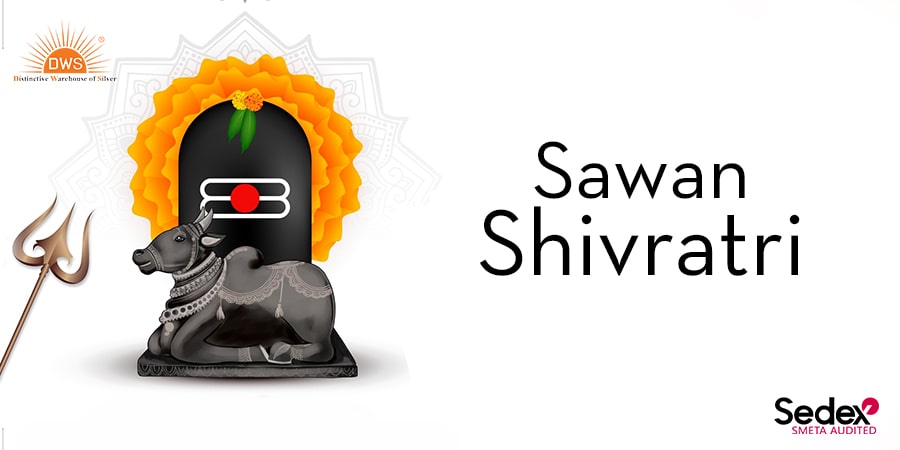- Written By Team DWS
- Festivals
- June 10, 2025
Embracing Devotion: Celebrating Sawan Shivratri with Rituals and Reverence
As the calendar awakens in the months of July and August, devotees across India and beyond prepare for one of the most auspicious occasions in the Hindu calendar - Sawan Shivratri. This sacred festival, dedicated to Lord Shiva, is a time of deep devotion, spiritual reflection, and community celebration. It invites devotees to embrace their spiritual path through rituals and reverence, symbolizing not just their devotion to Lord Shiva but also personal transformation.

Understanding Sawan Shivratri
Sawan Shivratri, or the epitome of the 'night of Shiva', falls in the month of Sawan (Shravan) according to the Hindu lunar calendar. This month is especially significant in regions like Maharashtra, Bihar, and Uttar Pradesh, where Lord Shiva is revered in his various forms. The festival celebrates the convergence of spirituality and nature, heralding monsoon rains that rejuvenate the earth and symbolize the cleansing of the soul.
Legend has it that during Sawan, the gods and demons churned the ocean to obtain the nectar of immortality known as 'amrit'. To protect the universe and prevent the poison from destroying it, Lord Shiva consumed the toxic elixir and held it in his throat, which turned blue. This act of sacrifice highlights his role as the protector of the cosmos and the destroyer of evil, forging a profound connection between his devotees and their faith.
Rituals that Resonate with Devotion
Devotees observe several customs and rituals during Sawan Shivratri that enhance their spiritual connection and foster a sense of community. Here are some of the key rituals embraced during this sacred time:
1. Fasting
Fasting is one of the most integral aspects of Sawan Shivratri. Devotees often choose to fast on Mondays (the day associated with Lord Shiva) throughout the month, abstaining from grains, non-vegetarian food, and alcohol. Instead, they nourish their bodies with fruits, nuts, and milk, which purifies the body and mind, allowing for a deepening of spiritual practices. It is believed that fasting helps in attaining spiritual clarity and devotion.
2. Ritual Bathing and Worship
Early morning rituals begin with a ceremonial cleansing. Devotees take holy baths to purify both body and spirit, often using Ganga water, for it is said to carry divine blessings. This bath is followed by the worship of the Shiva Linga, which represents Lord Shiva. Devotees offer water, milk, honey, and sacred bilva leaves (Bael) to the Linga while chanting mantras like “Om Namah Shivaya.” Each offering signifies deep reverence and the plea for guidance and blessings, creating a space for divine connection.
3. Night Vigil (Jaagran)
Sawan Shivratri is marked by a night vigil, where devotees gather in temples or homes, singing bhajans (devotional songs) and chanting mantras dedicated to Lord Shiva. These congregations foster a sense of unity and shared faith, allowing participants to express their love for the divine through joyous songs and dances. The energy and enthusiasm during these night vigils create an atmosphere of devotion, providing both solace and strength to the participants.
4. Creating a Sanctuary of Offerings
Many homes adorn their space with sacred imagery of Lord Shiva, placing flowers, incense, and lighted diyas (lamps) to create an ambiance of serenity. Special preparations of prasad (blessed food) like kheer (sweet rice pudding), fruits, and fresh flowers are prepared to offer to the deity. This act of preparing offerings reflects the personal touch of devotion, where each preparation is an act of love aimed at pleasing the divine presence.
5. Sharing and Community
Sawan Shivratri serves as a reminder of the profound importance of community and sharing among believers. Serving food to the needy or inviting family and friends to partake in the rituals fosters connections and strengthens community bonds. It turns the occasion into a festival of love, compassion, and giving, echoing the values that Lord Shiva embodies.
Embracing Transformation
Sawan Shivratri is not just a festival; it is a period of introspection and spiritual awakening. The rituals and reverence observed during this time encourage devotees to look inward, to reflect on their lives, and to seek personal transformation. As believers engage in their devotion, they come to understand the essence of sacrifice, humility, and surrender, themes central to Lord Shiva's teachings.
Conclusion
In a fast-paced world filled with distractions, Sawan Shivratri invites everyone to pause and embrace their devotion to Lord Shiva. It’s a time to celebrate the divine, foster community connections, and reflect upon the transformations within ourselves. As we partake in rituals and express our reverence, we not only honor the legend of Shiva but also cultivate a deeper understanding of our own spiritual journeys. The observance encourages us to let go of the noise around us, allowing us to listen to our inner voices and desires. Through prayers, fasting, and meditation, we find moments of clarity and peace that guide us towards personal growth and renewal. As we come together in collective worship, we strengthen our bonds with one another, creating a sense of unity and shared purpose in our quest for divine connection and enlightenment. Ultimately, Sawan Shivratri becomes a reminder of the transformative power of faith and the importance of nurturing our spiritual essence amidst life's chaos.

Sawan Shivratri FAQs: Everything You Need to Know About the Festival
Here are some frequently asked questions (FAQs) about Sawan Shivratri:
1. What is Sawan Shivratri?
Sawan Shivratri, also known as Shravan Shivratri, is a Hindu festival dedicated to Lord Shiva. It is observed on the 14th night of the waning phase of the moon (Krishna Paksha) during the month of Shravan (Sawan), which usually occurs in July or August according to the Gregorian calendar.
2. Why is Sawan Shivratri celebrated?
This festival is celebrated to honor and worship Lord Shiva, who is considered the supreme power and the destroyer of evil. Many devotees observe fasting and offer prayers to seek blessings for happiness, health, and prosperity.
3. When does Sawan Shivratri occur in 2025?
In 2025, Sawan Shivratri will be observed on 23rd July, depending on the lunar calendar.
4. How is Sawan Shivratri celebrated?
Devotees celebrate Sawan Shivratri by observing fasts, performing special prayers (puja) and rituals, chanting mantras, and singing devotional songs dedicated to Lord Shiva. Many visit Shiva temples and perform the "Abhishekam" (ritual bathing) of the Shiva Linga.
5. What is the significance of fasting on Sawan Shivratri?
Fasting on Sawan Shivratri is believed to purify the body and soul. It helps devotees to focus on spirituality, seek forgiveness for past sins, and attain peace of mind and divine blessings.
6. What are the common rituals performed during Sawan Shivratri?
Common rituals include:
- Offering milk, water, honey, and fruits to the Shiva Linga.
- Chanting the mantra "Om Namah Shivaya."
- Attending night-long vigils (Jagran) and participating in devotional singing.
- Performing the "Ashtakshara mantra" japa for spiritual growth.
7. Can anyone participate in the celebrations?
Yes, Sawan Shivratri is open to all. Devotees of all ages and backgrounds can participate in the celebrations by visiting temples, performing rituals at home, or joining community festivities.
8. What should I eat during the fast?
During the fast, devotees usually consume fruits, milk, and nuts. Some may prepare special dishes using sabudana (tapioca pearls) or kuttu (buckwheat) flour. Hard-core fasting involves abstaining from all food.
9. Are there specific days to celebrate Sawan Shivratri?
Yes, Sawan Shivratri is celebrated on four consecutive Mondays in the month of Shravan. Each Monday is significant, and the fourth Monday, known as "Mahashivratri," is considered the most auspicious.
10. What is the spiritual significance of Sawan Shivratri?
Sawan Shivratri provides an opportunity for spiritual cleansing and self-realization. Devotees believe that observing this festival and sincerely worshipping Lord Shiva can lead to personal transformation, spiritual growth, and ultimately liberation (moksha).
Conclusion
Sawan Shivratri is a sacred occasion for millions of devotees who seek a deeper connection with Lord Shiva. By participating in the rituals and observing the fast, one can earn the blessings and grace of this divine deity.
Popular on Blogs

Black Tourmaline: Meaning, Healing Properties, Fascinating Facts, Powerful Attributes, Versatile Uses, and Beyond
September 05, 2023 / BY Team DWS
Black Tourmaline, also known as Schorl, is a highly revered crystal with incredible metaphysical properties. It derives its name from the Dutch word "turamali," meaning "stone with ..

Carnelian Stone: Meaning, Healing Properties, Power, Facts, Color, Uses and More
December 26, 2023 / BY Team DWS
Carnelian is a vibrant and captivating gemstone that holds a plethora of meanings, healing properties, and powers. Its warm and fiery energy makes it a popular choice among crystal ..

Citrine: Exploring its Meaning, Healing Properties, Fascinating Facts, Powers, Versatile Uses, and Much More
November 18, 2023 / BY Team DWS
Citrine, with its warm golden hues, has captured the attention and imagination of people for centuries. This beautiful gemstone, commonly associated with wealth and prosperity, hol ..

Black Onyx: Unveiling the Meaning, Healing Properties, Fascinating Facts, Powerful Attributes, Versatile Uses, and Beyond
July 25, 2023 / BY Team DWS
Black Onyx, a striking gemstone admired for its deep black hue and elegant appearance, has captivated people for centuries. In this comprehensive guide, we will delve into the mean ..

Unveiling the Mysteries of Turquoise Stone: Exploring its Meaning, Healing Properties, Power, Facts, Color, Uses, and More
December 05, 2023 / BY Team DWS
Turquoise, with its captivating blue-green hue, has been adorning jewelry and artifacts for centuries. This striking stone has a rich history, rich symbolism, and a plethora of int ..

The History Behind The Popularity of Red Agate
December 23, 2022 / BY Team DWS
An Agate is a type of magma rock that takes many years till it is washed out naturally into the water. And that is the reason this stone has elements of water. This beautiful stone ..

Bloodstone: Unveiling the Meaning, Healing Properties, Facts, Powers, Uses, and More
August 21, 2023 / BY Team DWS
Bloodstone, with its captivating deep green color with specks of red, is a mesmerizing gemstone that has fascinated civilizations for centuries. It possesses unique healing propert ..

Plan a Perfect Valentine's Week with Our Valentine Week List 2025
January 22, 2024 / BY Team DWS
Valentine's Day is undoubtedly the most romantic day of the year, but we believe that one day is just not enough to express your love and make your partner feel special. That's why ..


